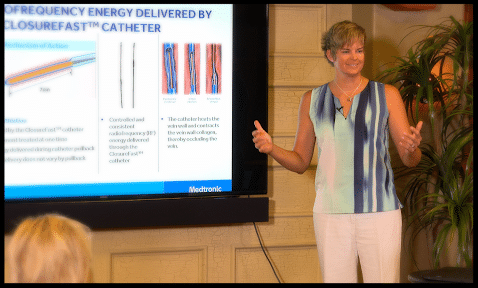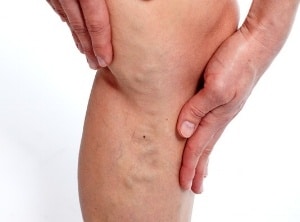
Vulvar Varicosities: Don’t Suffer in Silence!
It seems conceivable that when health experts estimate that 10 percent of pregnant women experience vulvar varicosities, that is to say vaginal varicose veins, they could be grossly underestimating the incidence of this condition.
There are women—who knows how many—who will not report this pain, itch, heaviness and general discomfort in the vulva, either because they chalk it up to the general joy and discomfort of pregnancy, or because they are simply not comfortable talking about it. These women might not know that there are qualified vein specialists who can help with this condition. You might be one of those women.
Vulvar Varicosities Can Persist Past Pregnancy
The problem is that once there, a vulvar varicosity will often not go away. Vulvar varices may become asymptomatic without the added hormones and baby pressing on the blood vessels. But the underlying condition remains, perhaps to return, persist, or worsen with another pregnancy—or for those women who are genetically predisposed to varicose veins.
This can make walking, standing, and sitting, uncomfortable. Sex can become less fun, or even painful.
Vulvar Varicosities Treatment and Relief
If bulging, painful vaginal varicose veins are a problem for you—during pregnancy or after—there are simple things you can do to try to find some relief.
- Consult with your doctor about topical treatments for the itch, pain and feeling of heaviness;
- Consider compression garments. They are strappy in appearance, but the pressure they provide can help relieve some discomfort in the surrounding tissue;
- Change your body position often. Alternate sitting, standing, walking and lying down;
- Some experts suggest that you go for a swim if you are pregnant. The buoyancy of the water can lift baby off of blood vessels in the vulvar and perineal areas;
- Elevate the hips slightly when lying down. Use gravity to take a load off the blood vessels.
If these varicosities persist, and they are affecting your quality of life, seriously consider making an appointment for a free consultation with a qualified vein specialist today. Dr. Jilanne Rose, DNP of Advanced Vein Institute of Arizona specializes in treating vulvar varicosities and superficial varicosities of the lower limb and has performed thousands of procedures in women who are experiencing the same discomfort that you are. She will be able to tailor a treatment plan just for you and determine whether Chronic Venous Insufficiency is a contributing factor in your condition.
The only catch is that you will have to talk about it...just a little bit.
The good news, however, is that a professional like Jilanne Rose, DNP-C will make the process—from consultation to treatment to recovery—as comfortable as possible.
Is there anything worse than itchy varicose veins? Maybe, but itchy veins remains high on the list of issues we would love to resolve before they drive us crazy. If you are experiencing itching around your varicose veins, it could be a message from your body that it is time to have your veins checked…
Read MoreThe full story on Chronic Venous Insufficiency, what it is and how to treat it. A video presentation by Jilanne Rose, DNP-C, Clinical Director. Run Time 24:46. TRANSCRIPT What’s the Difference Between Veins and Arteries? When we talk about vascular health and vascular disease most people think about arteries. When we talk about the…
Read MoreA group of Gilbert Arizona Residents concerned about Chronic Venous Insufficiency gathered on Saturday July 16th for an interactive discussion on CVI symptoms, causes and treatments. Chronic Venous Insufficiency, Venous Reflux Disease and Varicose Veins affect over 30 million American men and women. Unfortunately, many do not get treated as they believe varicose veins are…
Read MoreCan Chronic Venous Insufficiency (CVI) be reversed? Unfortunately the short answer to this question is no; but CVI can be treated with minimally invasive procedures which can reduce symptoms and improve quality of life tremendously! Chronic Vein Insufficiency Causes In order to understand why venous insufficiency or peripheral venous insufficiency cannot be reversed, we must…
Read MoreWhat can you do to treat bleeding varicose vein and spider veins? First and foremost, don’t panic. Although the visual effect of a ruptured varicose vein or bleeding vein can be alarming, there are some simple things that can be done to get the bleeding to stop. If you can reach the area that is…
Read MoreWhy are varicose veins painful? The discomfort associated with varicose veins is caused by a combination of factors. When veins are weak, the blood which is supposed to return to the heart in a timely fashion, settles and pools in the superficial vein system. This pooling of blood worsens when patients stand or sit in…
Read MoreEndovenous Ablation Definition Taken literally, endovenous ablation is the removal of a vein from within. ‘Endo’ means internal or inside, ‘venous’ refers to a vein, and ablation is to ‘remove’. In the instance of veins, it is no longer necessary to physically remove a vein from the leg (vein stripping) to improve symptoms or the…
Read MoreThe newest procedure for the treatment of varicose veins was approved by the FDA about two years ago. It is what has been termed a non-tumescent non-thermal therapy. What this means is that it does not require a lot of numbing medicine to complete, and it does not use a heating element to close or…
Read MoreWhat is the best treatment for varicose veins? No varicose vein is the same; no person’s symptoms are the same; and so the best procedure for varicose veins is not always the same. The treatments associated with vein disease are based on a patient’s symptoms, vein size, location, contributing conditions, and ultrasound findings. Different…
Read More

